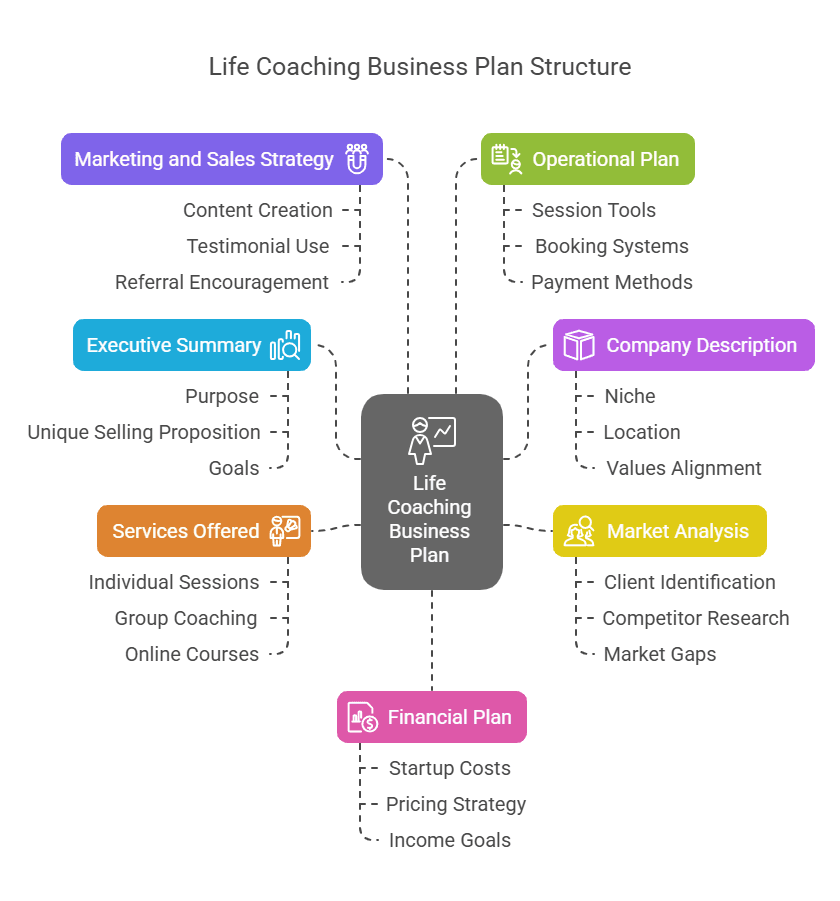Being a great coach is just the start success also requires a clear plan to attract and retain clients. Starting a life coaching business without a clear plan is like setting off on a road trip without a map. Sure, you might eventually reach your destination, but you’ll waste plenty of time and gas along the way. What if you had a simple, free template to guide you every step of the way? That’s exactly what this article gives you a clear, no-nonsense plan to help your life coaching business succeed.
This Life Coaching Business Plan Template will help you create an effective plan to grow your business, define your services, and target the right clients. Ready to get started? Let’s dive in!
Why Do You Need a Life Coaching Business Plan?
Think of your business plan as your GPS. It keeps you focused, ensures you don’t stray off track, and helps avoid costly mistakes. With it, you set clear goals, understand your audience deeply, and pinpoint exactly how you’ll stand out from competitors. A solid plan also opens doors to funding, valuable partnerships, and steady, sustainable growth.

But there’s more. Imagine you’re excitedly coaching your first few clients, and suddenly you hit a wall no new bookings, your marketing feels scattered, and income slows. Without a clear roadmap, this confusion quickly leads to frustration or even burnout.
Your life coaching business plan doesn’t just help you avoid these struggles; it also gives you confidence. You’ll clearly know exactly what to do each day, week, and month to grow your coaching business steadily. You’ll have a straightforward blueprint guiding your marketing, operations, and finances so you can spend your energy doing what you love most: coaching clients.
Ready to create a clear and practical plan for your coaching success? Let’s dive into exactly what your life coaching business plan should include.
Step-by-Step Life Coaching Business Plan Template
You don’t need fancy jargon or a business degree to write this plan. Just follow these straightforward sections:
Executive Summary
Your executive summary is your business at a glance. Keep it short, clear, and compelling. Answer these questions:
- What’s the purpose of your life coaching business?
- What makes your coaching unique?
- What specific goals do you aim to reach in the short and long term?
Example: “My coaching business helps busy professionals overcome burnout by teaching stress-management techniques through personalized online sessions. My goal is to gain 30 steady clients within my first year.”

Company Description
Clearly describe what your business does, including your coaching niche (like wellness, career growth, personal relationships), your location (online, in-person, or both), and how your coaching aligns with your values.
Be specific: “I offer online career coaching, helping college graduates land their first meaningful job. My approach combines practical career advice with emotional support, matching my belief that meaningful work leads to happier lives.”
Market Analysis
Doing a quick market analysis helps you deeply understand your clients and competition. Start by clearly identifying who exactly you want to coach. What specific problems do they face, and why are your services the solution?
Spend a few minutes researching competitors by simply Googling similar coaching businesses. Visit their websites, see how they describe their services, and note their pricing and customer reviews. Also, check their social media pages to observe engagement and the types of content they share. This quick research helps you discover gaps in the market you can easily fill.
Next, use free online tools like Google Trends to confirm your coaching niche is in steady demand. You might also join forums, Facebook groups, or LinkedIn communities where your ideal clients discuss their struggles. Pay close attention to their conversations, noting phrases or words they commonly use. Understanding your audience’s real-world frustrations and desires will make your marketing clearer and your coaching more effective.
Services Offered
Describe precisely what you offer:
- Individual sessions (describe length and format)
- Group coaching or workshops
- Online courses or resources
Then clearly state your pricing:
“Individual coaching sessions: $100/hour. Group coaching workshops: $300 for 4 sessions.”
Marketing and Sales Strategy
Your coaching business depends entirely on clients. Without effective marketing, even the best coaches struggle to find steady business. Here’s how to clearly attract, engage, and convert clients:
Start by consistently posting content your audience finds genuinely helpful, like short videos or posts answering their common questions or sharing quick, actionable tips. Use platforms like Instagram, LinkedIn, or YouTube whichever aligns most naturally with your audience.
One simple but powerful approach is showcasing testimonials or success stories from satisfied clients. After a successful coaching session or program, ask clients if you can feature their feedback on your website or social media. Positive client experiences build trust and credibility, making potential clients more comfortable reaching out.
Don’t overlook referrals. Encourage current clients to recommend you to others, possibly offering small incentives like a discount on their next session. Finally, make booking sessions easy. Tools like Calendly integrated into your website or social profiles let clients schedule appointments without hassle, greatly increasing the chance they’ll book right away.
Operational Plan
This section outlines your daily business activities and tools you’ll use:
- Where will you run sessions (Zoom, Skype)?
- How will clients book appointments (Calendly, Google Calendar)?
- How will clients pay (PayPal, Stripe)?
Keep it simple: “I’ll run sessions through Zoom, appointments booked via Calendly, and payments accepted through Stripe.”
Financial Plan
Don’t skip finances, even if numbers make you uneasy. Clearly outline your startup costs and expected income:
- Startup expenses (website, marketing, software)
- Pricing strategy
- Income goals for 6 months, 1 year, and 3 years
Example: “Startup costs: $2,000 (website $500, marketing $800, tools $700). Goal: $30,000 revenue first year from coaching sessions and courses.”
Common Mistakes to Avoid
Skipping the planning stage can cause problems down the road. Avoid these common traps:
- Setting unclear goals (“I just want to help people” isn’t enough)
- Forgetting to research your market (you must know who your customers are)
- Unrealistic financial expectations (keep your income goals practical)
- Overlooking client attraction strategies (marketing isn’t optional!)
Now, here’s the good part: You can avoid these errors easily by sticking closely to the template we’ve provided.
Conclusion
Starting your life coaching business with a solid plan sets you up for success from day one. This free, easy-to-use template removes the guesswork, helping you clearly see the steps ahead. Keep revisiting your plan as you grow, adapt as needed, and build trust with clients through preparation and clarity.
Your confidence will attract loyal clients who value your guidance and expertise. So, fill out this template honestly, follow through on each step, and launch your coaching career with purpose. Your clients and your dream business are closer than you think.





